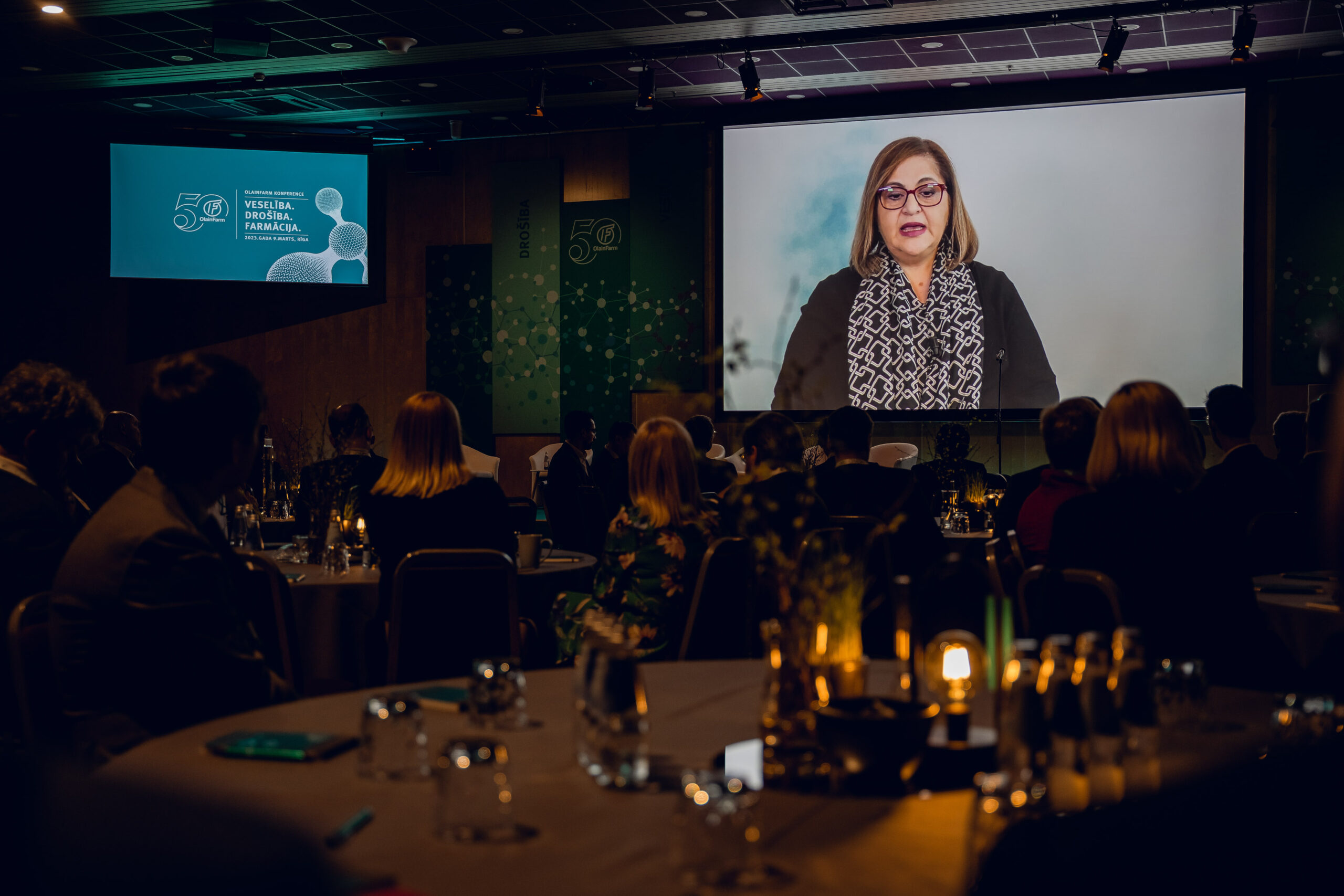Speaking during the opening ceremony of Olainfarm’s conference “Health. Security. Pharmacy”, European Commission Executive Vice-President and Trade Commissioner Valdis Dombrovskis stressed that pharmacy is one of the rare industries in which Latvia has succeeded in securing powerful positions within the Baltics, moreover with dominant national capital, but the industry’s future growth is dependent on today’s investments and innovations. The need for major support for the pharmaceutical industry throughout Europe was also emphasised by European Chemical Industry Council Fine Organic Synthesis, Fine Chemicals, Biocides and Resins Clusters Director Maggie Saykali. She pointed out that along with other industry support measures, it is vital to strengthen the European Union’s (EU) pharmacy supply chains and in particular their independence from Asia.
Since 2021, although the sales volume of chemical products in the EU has declined significantly, however, the pharmaceutical industry is still in a much healthier position, revealed European Chemical Industry Council Representative Maggie Saykali. In Latvia alone, the chemical industry is comprised of 275 active businesses, with a total turnover in excess of EUR 700 million, 24% of which is made up of pharmaceuticals. According to Saykali, the world needs and will continue to need medicines – this is due to the aging population and the improved availability of medicines. In the past three years, the prices of medicinal products globally have risen by 16%, and it is anticipated that they will rise by another third during the next five years. However, the reality of the EU pharmaceutical industry is not so rosy – primarily due to the increasing influence of the Asian region, and China and India in particular.
“During the past thirty years, European pharmaceutical companies have outsourced the production of their most popular drugs to Asia. There are various reasons for this including significantly lower production and labour costs, more convenient legal regulation, relaxed environmental protection regulations, etc. Unfortunately, as a result, right now EU medicinal product makers find themselves in a critical situation – only a quarter of the total volume of products is made in Europe. Moreover, along with production processes, the main technologies are also being redirected to other parts of the world. The EU’s global market share has fallen from 53% in 2000 to 33% in 2020, and many key products are no longer made in Europe at all,” warns Maggie Saykali.
The implications for society were illuminated by the Covid-19 period, which laid bare the vulnerability of EU supply chains and demonstrated the need for a powerful strategy to bolster the EU’s autonomy. “A similar situation can be observed in Latvia: thanks to its strong scientific base and traditions, Latvia can already provide a full developmental and supply chain for medicines, incorporating high level education, research and innovations, industrial production and exports, local and regional supply and pharmaceutical care, as well as develop original medicines. However, healthcare products from local manufacturers comprise only 4% of the local pharmaceutical market. Increasing the market share of local medicinal product makers tenfold would make it possible to reinforce national security and the availability of vital medicines to the Latvian public,” acknowledged AS Olainfarm Chairman of the Board Juris Bundulis.
“Both the availability of the most important raw materials and production capacity must become the main aspects in the EU’s plan to consolidate the autonomy of pharmaceutical supply chains. We need powerful financial policies and administrative support mechanisms to relocate supply chains back to Europe, and to bolster the local pharmaceutical industry. However, to accomplish this, this unified approach is required throughout Europe,” explains Maggie Saykali. “During the past three years, we have repeatedly challenged EU decision-makers to find solutions, to turn the situation around by 180 degrees, and to create a Europe-based, strong, innovative, internationally competitive and sustainable pharmaceutical supply chain. We must prevent the further drainage of knowledge and production processes away from Europe and support local producers with investment in the construction or modernization of production plants, along with the introduction of sustainable production technologies.”
According to Saykali, these solutions must not be delayed – they are needed now: “As of yet, the pharmaceutical strategy proposed by the European Commission and the European Parliament in 2020 has not provided specific solutions. A sustainable and flourishing industry cannot be built on a weak supply chain, so all need to talk about this together. This is the only way can we guarantee that European citizens will have access to safe and reliable medicines at x hour.”
